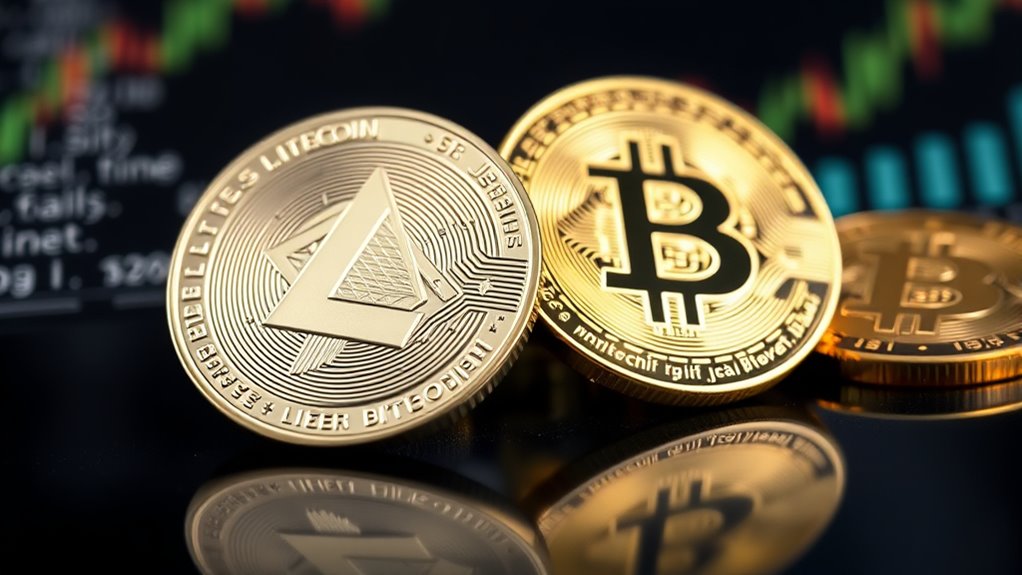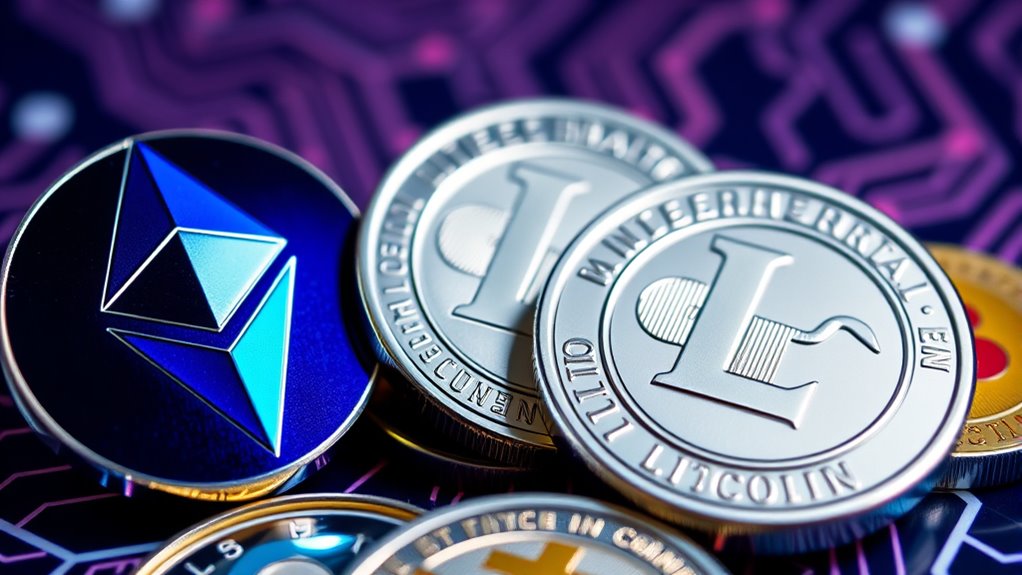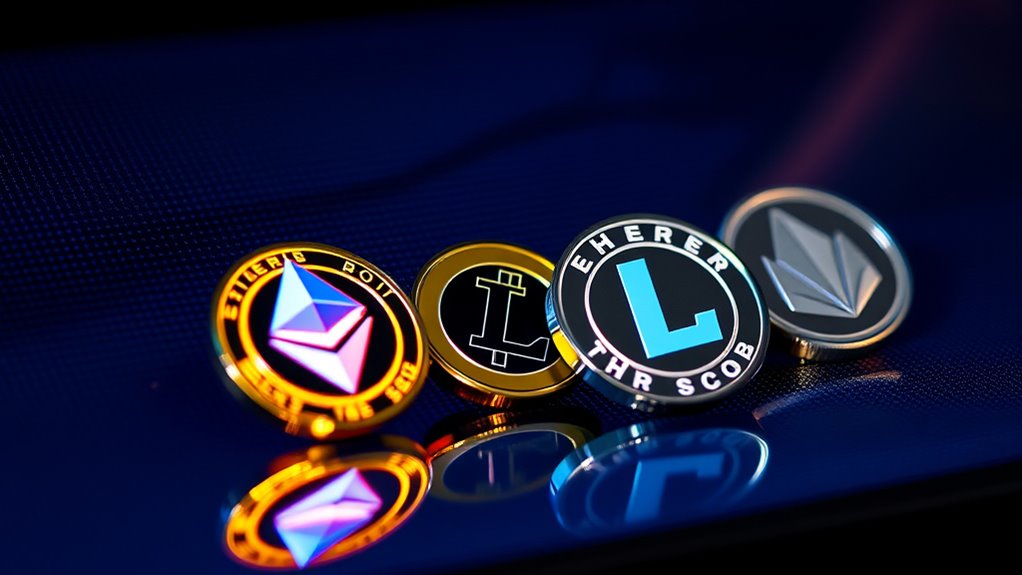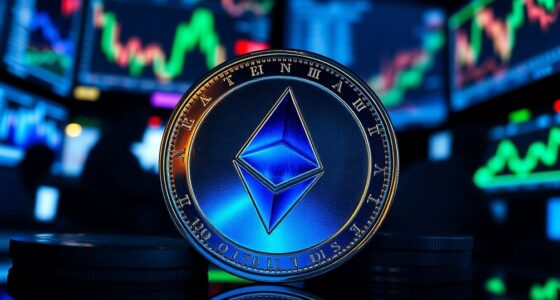Major altcoins like Ethereum and Litecoin each have unique features that make them stand out. Ethereum is known for its smart contracts, which enable decentralized apps and further blockchain innovation. Litecoin offers faster transactions and lower fees, acting as digital cash or “silver” to Bitcoin’s “gold.” Other altcoins like Ripple, Cardano, and Dogecoin serve different purposes, from cross-border payments to community support. Exploring these options reveals a diverse and evolving crypto landscape—something you’ll uncover as you explore more.
Key Takeaways
- Ethereum is a pioneering platform for smart contracts and decentralized applications, enabling trustless and transparent digital transactions.
- Litecoin offers faster transaction times and lower fees, serving as a practical digital currency alternative to Bitcoin.
- Altcoins like Ripple, Cardano, and Dogecoin have unique features, focusing on cross-border payments, sustainability, and community support.
- Major altcoins diversify blockchain technology, promoting innovation, security, and transparency across various sectors.
- Understanding each altcoin’s purpose and technology helps in evaluating their roles within the broader cryptocurrency ecosystem.
Understanding Ethereum: The Smart Contract Pioneer

Have you ever wondered how Ethereum revolutionized blockchain technology? It introduced the concept of smart contracts, which are self-executing agreements with the terms directly written into code. This innovation allows decentralized applications (dApps) to run without intermediaries, opening up countless possibilities. Ethereum’s blockchain isn’t just a digital currency; it’s a platform for developing complex, automated operations. You can create everything from decentralized finance (DeFi) projects to gaming platforms, all secured by Ethereum’s robust network. Its programmable nature makes it flexible and powerful, enabling innovation across industries. Unlike Bitcoin’s focus on digital cash, Ethereum’s primary goal is to facilitate trustless, transparent agreements, transforming how transactions and contracts happen globally. Additionally, the programmable blockchain aspect of Ethereum enables developers to build a wide variety of applications, making it a versatile tool in the blockchain ecosystem. This shift truly set the stage for the broader blockchain revolution and the emergence of smart contract technology. The ability to customize and extend functionalities through blockchain development tools further enhances Ethereum’s position as a pioneer in this space. Moreover, the integration of decentralized applications has expanded Ethereum’s impact beyond simple transactions, fostering innovation in numerous sectors.
Litecoin and Its Role as Silver to Bitcoin’s Gold

Litecoin often earns the nickname “silver to Bitcoin’s gold” because it shares many similarities with Bitcoin while offering notable differences that make it a valuable counterpart. You’ll notice Litecoin’s faster transaction times, lower fees, and a different hashing algorithm, which enhance usability. Its purpose is to provide a more practical, everyday digital currency. To understand its role better, consider these key points:
- Litecoin processes transactions approximately four times faster than Bitcoin.
- It has a maximum supply of 84 million coins, quadruple Bitcoin’s limit.
- Its Scrypt algorithm makes mining accessible to more users, promoting decentralization.
These features position Litecoin as a reliable, efficient alternative for transactions, complementing Bitcoin’s store-of-value role.
Exploring Other Notable Altcoins and Their Unique Features

Curious about how other notable altcoins stand out in the crowded cryptocurrency landscape? Many altcoins offer unique features that set them apart from Bitcoin and Ethereum. For example, Ripple focuses on fast, low-cost cross-border payments, while Cardano emphasizes sustainability and peer-reviewed research. Dogecoin started as a meme but became popular for community-driven support and fun branding. Here’s a quick comparison:
| Altcoin | Unique Feature |
|---|---|
| Ripple | Real-time global payments |
| Cardano | Formal verification and sustainability |
| Dogecoin | Strong community and meme culture |
These projects demonstrate diversity in purpose, technology, and community engagement, making the crypto space more dynamic and tailored to different needs. Additionally, blockchain innovation continues to drive new developments and improvements across these and other altcoins, highlighting the importance of ongoing technological advancements in the industry. Embracing decentralized networks enables these altcoins to enhance security and transparency in their respective applications.
Frequently Asked Questions
How Do Altcoins Influence the Overall Cryptocurrency Market?
Altcoins influence the overall cryptocurrency market by introducing innovation, increasing competition, and diversifying options for investors. When altcoins perform well, they can boost market confidence and attract new users, often leading to higher Bitcoin prices. Conversely, poor altcoin performance can cause market fluctuations or decline. Your investment decisions often depend on altcoin trends, as they shape market sentiment and overall stability in the crypto space.
What Are the Risks Associated With Investing in Lesser-Known Altcoins?
Investing in lesser-known altcoins carries significant risks. You might face high volatility, making your investments unpredictable. These coins often lack liquidity, so selling them quickly could be tough. There’s also a higher chance of scams or project failures due to limited development or transparency. Be sure to do thorough research and only invest what you can afford to lose, as these risks can lead to substantial losses.
How Do Transaction Speeds Vary Among Different Altcoins?
Imagine sending a quick message and it arrives instantly—that’s how transaction speeds differ among altcoins. Some, like Litecoin, focus on rapid processing, ensuring your transactions settle in seconds. Others, like Ethereum, balance speed with additional features, which can sometimes slow things down. You’ll find that transaction times vary widely, influenced by network congestion and design choices. So, depending on your needs, choosing an altcoin with faster speeds might be essential for seamless transactions.
Can Altcoins Replace Bitcoin as the Dominant Cryptocurrency?
You wonder if altcoins can replace Bitcoin as the dominant cryptocurrency. While some altcoins offer faster transactions and unique features, Bitcoin’s widespread recognition and security make it unlikely to be replaced soon. However, if an altcoin proves to be more scalable, user-friendly, and widely adopted, it could challenge Bitcoin’s dominance. For now, Bitcoin remains the main player, but the crypto landscape is always evolving.
What Factors Determine an Altcoin’s Long-Term Success?
You want to know what determines an altcoin’s long-term success. Factors like strong technology, real-world use cases, active development, and a dedicated community play vital roles. You should also consider its market adoption, partnerships, and how well it adapts to changing trends. If an altcoin can maintain innovation and trust, it stands a better chance to succeed over time, even against larger competitors like Bitcoin.
Conclusion
Now that you’ve explored Ethereum, Litecoin, and other altcoins, you see how each offers unique strengths, much like a Swiss Army knife in your digital wallet. Remember, the crypto world’s constantly evolving—like the wheel turning forward, not backward. Staying informed helps you navigate this landscape wisely, so you won’t find yourself chasing shadows or missing out. Embrace the knowledge, and you’ll be better equipped to seize opportunities in this ever-changing crypto era.










